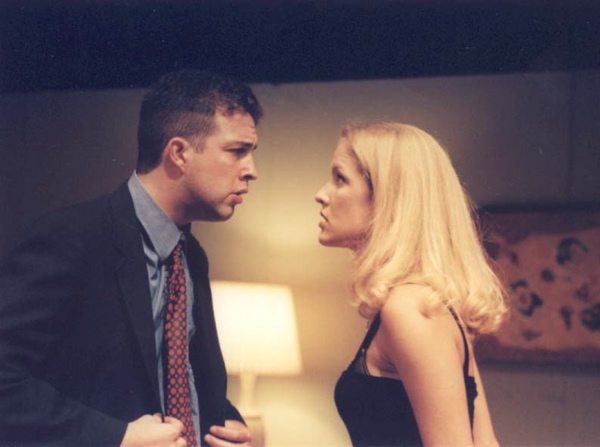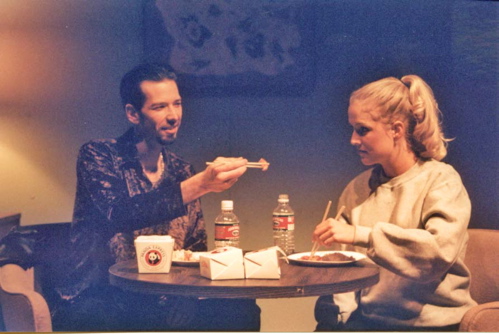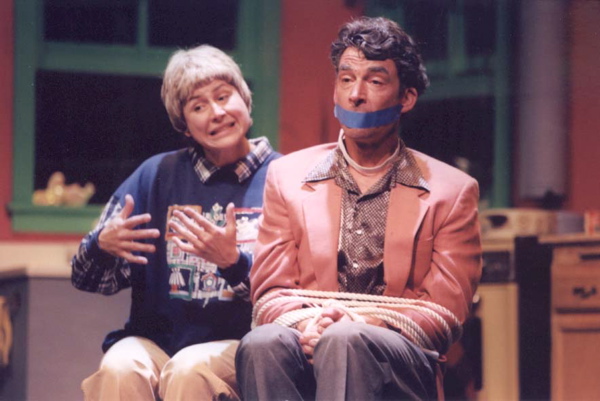Back to
Home page
Linked from
Genesis West
A Santa Barbara Theatre Company: 1998-2002
I remarked to my son Julian that I was happy living in Santa Barbara and had everything I needed except I was not doing any theatre. He said, “What’s stopping you?” So in March 1998 I produced my play “Trouble” at Center Stage Theater, and rather than produce it under the banner of my own name, I said “Genesis West presents…,” basing the name, obviously, on Theatre Genesis in New York, a theatre of playwrights and a model of fine presenting. I had been practicing to produce at the larger, historic Lobero Theatre, where I had presented concerts by pianists Jerome Lowenthal and Vassily Primakov and violinist Gilles Apap as well as “Choreosplash!” for the Santa Barbara Dance Alliance. Nancy Lynn, the executive director, taught me how to make a budget, and that is the whole key to producing. The budget not only breaks down how the money comes and goes, it shows you everything you have to deal with, rent, box office, advertising and publicity, talent, set, costumes, lights, crew—and that’s about all there is to it. It had never been so clear to me.
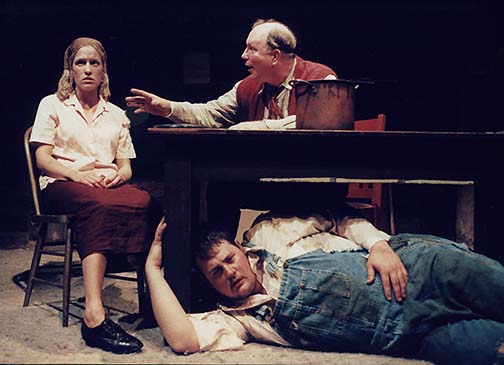
Kinsey Packard, Fred Lehto, and Noah Harpster (under table) in “Mud” by Maria Irene Fornés, directed by Maurice Lord, Center Stage Theater, 2001
The key to my taking the step into producing was that I had found a director after all these years. Maurie Lord was still a student at UCSB when we met. At the urging of his teacher, Bob Potter, Maurie invited me to see his production of Sam Shepard‘s "Icarus’s Mother," which I had directed at the Caffè Cino, and I liked it very much: I thought the acting worked better than my production, though there was no scenography. The next year Bob Potter produced my short play “The Dinner Show” as part of an evening of ten-minute plays, and Maurie directed it. It proved an easy and happy collaboration. He loved the script, was delighted to go along with all my wacky ideas (for example, two of the characters carry potted trees, hiding their faces), and whenever there were decisions to be made, we agreed. I had never had such a good relationship with a director.
“Trouble” was trouble, plagued by recalcitrant actors and a wretched set design, but people liked it, Maurie and I had worked together well, and I had learned that producing was something I could do, and enjoyed. Genesis West was real and alive.
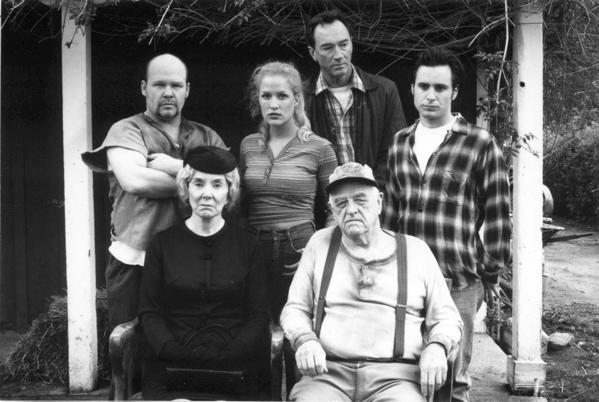
Robert Riechel Jr. and Kinsey Packard in “Buried Child” by Sam Shepard, directed by Maurice Lord, Lobero Theatre, 1999
After “Trouble” closed, Maurie and I went on meeting for coffee once a week at Caffè Siena, sitting out on the back porch so Maurie could smoke. One day he said that his dream was to direct “Buried Child” at the Lobero Theatre, and I thought why not? Let’s do it. I was on the board of the Lobero, pained by the dearth of drama on its beautiful historic stage. A misguided attempt to start a theatre company had recently crashed and burned. I could do it much less expensively, “Buried Child” is a great, Pulitzer Prize-winning play, and there is a wealth of acting talent in Santa Barbara. I had lost $4,500 on “Trouble,” which I could more or less afford, but the Lobero was going to be way more costly: my budget was almost $40,000, and I set about raising money to cover the inevitable shortfall. I was frustrated that more of my fellow board members did not step forward to support the production, but I managed to raise $23,800; in the long run the production only cost me $1,775 personally, though of course I worked without pay for months. I was also disappointed that audiences were not larger: the theatre seats 650 and we never had more than 200 or so. The production was excellent and powerful.
I became aware of the Canadian playwright George F. Walker when I visited my friend David Gurin and his family in Toronto. David is a compadre from the old days in the Village and knows what I like. He and his wife Laura took me to the Factory Theatre to see Walker’s “The End of Civilization,” directed with extreme intensity by the author, which had me on the edge of my seat. Walker is well-known in Toronto but we “Americans” are barely conscious of our neighbors to the north and I had never heard of him. “The End of Civilization” was one of six plays, all set in the same motel room, under the collective title “Suburban Motel.” I read them and was crazy about them, and so was Maurie; we decided to do two of them as our next production, each directing one—I would have liked to do all six.
Back at Center Stage Theater, Maurie directed “Criminal Genius,” a play about a feckless crime caper gone wrong, and I directed “Featuring Loretta,” a comedy about a hapless young woman who runs away from her stultifying small-town life looking for adventure, the sleazy and helpless men she attracts, and the young Russian woman whose ex-KGB father owns the motel. I loved the play, which was funny and touching. The cast were all wonderful, and Maurie’s work on “Criminal Genius” was excellent.
Rashly, we decided to follow up with a big play of Walker’s, “Escape from Happiness,” at the Lobero. By now we had a wonderful group of actors to work with, many of them appearing in several plays, and this was a terrific production, although I am sorry I did not press Maurie to cut half an hour out of it. Getting a set built for a big theatre is one of the biggest challenges for a penny-pinching producer, and I was delighted when Kent Hodgetts offered to design it and build it at his workshop on the historic Hoffmann property near the Mission, which he and his wife were restoring to its original splendor. They invited us to rehearse in the music room of the mansion, which was largely unoccupied. Kent designed a brilliantly engineered set of variously angled interlocking wall units, which would bolt together easily and hold each other up. I helped him with construction as much as I could, although I was running around doing quite a few other things as well and he needed more help. (There are never enough people to do things these days.) Unfortunately our hosts’ patience ran out before we were quite ready to move into the theatre, but it all worked out.
The set was fabulous, complicated, effective, bright colored. Maurie directed and I designed the lights, which was fun and better than the “Buried Child” lighting, which that set designer had arrogated to himself. What I had not taken seriously enough was that Walker was an unknown playwright, the play was unknown, and the title apparently sounded depressing, although I never actually figured out what it meant. As a result audiences were even thinner this time, and I had managed to raise less money, and I lost $13,500 on the adventure, not to mention working fiercely hard for two or three months to make it happen. As I had now quit my day job editing Santa Barbara Magazine, I no longer had the cash flow to support producing on such a lavish scale: we would go back to Center Stage.
It was time to do one of my own plays. I went to Taos for two weeks to visit Julian and write. I rented a room from an aged poet named Judson Crewes, a lovely man and fine writer now confined to bed and chair, and wrote “Dogs Bark All Night.” I was reading a history of war and some strong articles in the New York Review of Books. It is the most direct play I have ever written, direct in its passionate horror of war and in the emotional exchanges within the family. It was conceived for Center Stage Theater, a fairly roomy black box, and it worked perfectly in the space. We had a fine cast as usual and Maurie did a meticulous job of directing it. Our run fortuitously coincided with the standoff between Bush and Gore after the 2000 election, which gave the play’s ferocity an extra kick. Although we had now attracted a small cadre of admirers, I had not succeeded in attracting a general audience, and I lost $6,000 on my heartfelt little play, which ended on an upbeat note very far from what would really happen.
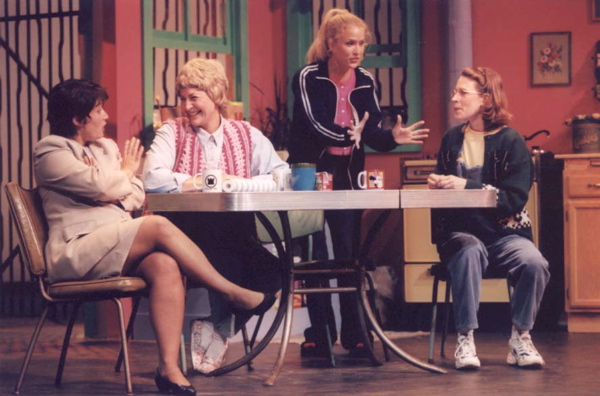
ClaireMarie Mallory, Leslie Gangl Howe, Kinsey Packard, and Erica Kylander-Clark in “Escape from Happiness”
I was still an idealist, and now we were rolling. Defining ourselves as a Santa Barbara theatre company devoted to plays by contemporary writers, we had put out a brochure and announced two productions that season. The second was another pairing of two plays by a single playwright, in this instance Maria Irene Fornés, an old comrade whose plays I especially love. Maurie directed “Mud,” a very dark play about an illiterate young woman, her possessive brother, and a slippery stranger who teaches her to read. I directed “The Danube,” commissioning rear-projected woodcuts from the artist Rafael Perea de la Cabada and a beautiful musical score from cellist Jakub Omsky. It was a perfectly realized production of both plays, the best work I have ever done.
I was so pleased that I filed paperwork to incorporate Genesis West and start moving toward nonprofit status. But just then Maurie bailed out, maintaining that I had fired him when I said mid-run that I thought “Mud” was getting too slow. His youthful energy had been a good complement for my experience, but even with his participation these productions had been overly exhausting, and in truth I was not sure it made sense to work so hard producing so he could have the fun of directing. He would eventually have to produce himself if he wanted to go on directing his choice of plays. I felt very let down that he did not come up with exciting new projects, but he was thinking about directing something in Los Angeles and wanted time off.
I was not sure Genesis West could go on without Maurie, but I did one more project, “Turnip Family Secrets.” I had written this “play with songs” twenty years before, when my sons Julian and Alfred were little, but I had not found anyone to do the music. Joe Woodard, a Santa Barbara music writer and experimentally inclined musician, leader of the band Headless Household, saw the possibilities in my lyrics and signed on. I was thrilled. Joe could relate to the twistiness of this play’s imaginative world, and it was fun and fulfilling to hear my words sung, as I had intended them to be. I was feeling the limits of my energy and did not direct, but I worked closely with Deanne Anders to get the style right. The cast was marvelous and the musicians were great. The big problem, as I had foreseen, was getting a coherent scenic design that met all the play’s demands; in the event I failed to find a comprehensive designer, but my son Julian came and worked hard to get the various set pieces made, and it was a wonderful show.
I moved away from Santa Barbara in 2003 and eventually dissolved the stillborn corporation. When Maurie started talking about starting a theatre company of his own, I encouraged him to revive the name, and happily he did. He incorporated anew, became a nonprofit, and Genesis West reappeared at Center Stage Theater in 2005-06 with two plays by Caryl Churchill, “Blue Heart” and “Far Away.” Maurie flew me down to design the lights for both shows. He had the best people in town working with him, actors, designers, tech and crew, and it was as pleasurable as ever to be part of this good work. I won an Indie award for “Blue Heart.”
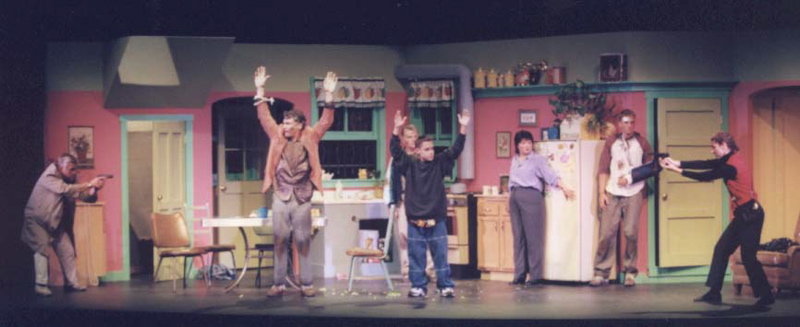
Braden McKinley, David M. Brainard, Don Stewart (hidden), Steven Gonzales, ClaireMarie Mallory, Joel Keeler, and Necar Mohsenzadegan in “Escape from Happiness”
GENESIS WEST PRODUCTIONS, 1998-2002
“Trouble” by Michael Smith, directed by Maurice Lord, Center Stage Theater, April 1998
“Buried Child” by Sam Shepard, directed by Maurice Lord, Lobero Theatre, June 1999
“Featuring Loretta” and “Criminal Genius” by George F. Walker, the former directed by Michael Smith, the latter by Maurice Lord, Center Stage Theater, January 2000
“Escape from Happiness” by George F. Walker, directed by Maurice Lord, Lobero Theatre, June 2000
“Dogs Bark All Night” by Michael Smith, directed by Maurice Lord, Center Stage Theater, November 2000
“Mud” and “The Danube” by Maria Irene Fornés, the former directed by Maurice Lord, the latter by Michael Smith, Center Stage Theater, March 2001
“Turnip Family Secrets” by Michael Smith, music by Joe Woodard, directed by Deanne Anders, Center Stage Theater, April 2002
INDEPENDENT THEATRE AWARDS (INDIES):
1999 Larry Williams for his performance in “Buried Child”
2000 Fred Lehto for his performance in “Criminal Genius”; ClairMarie Mallory for her performance in “Featuring Loretta”
2001 George Backman for his performance in “The Danube”; Jakub Omsky for his music for “The Danube”; Noah Harpster for his performance in “Mud”; Maurice Lord for his direction of “Mud”; ClairMarie Mallory for her performance in “Escape from Happiness”; David Brainard for his performance in “Escape from Happiness”
2002 Joe Woodard for his music for “Turnip Family Secrets”
